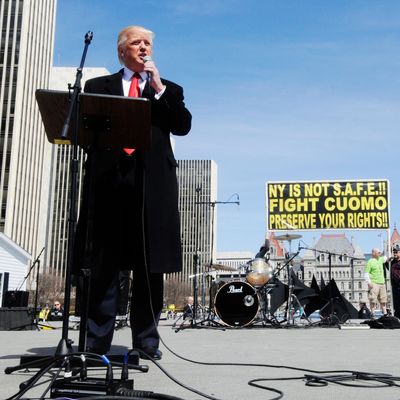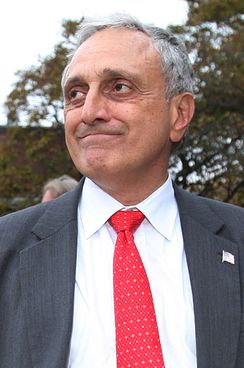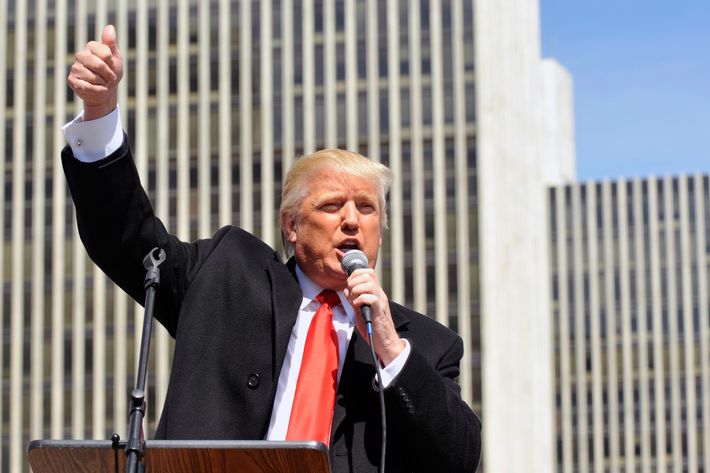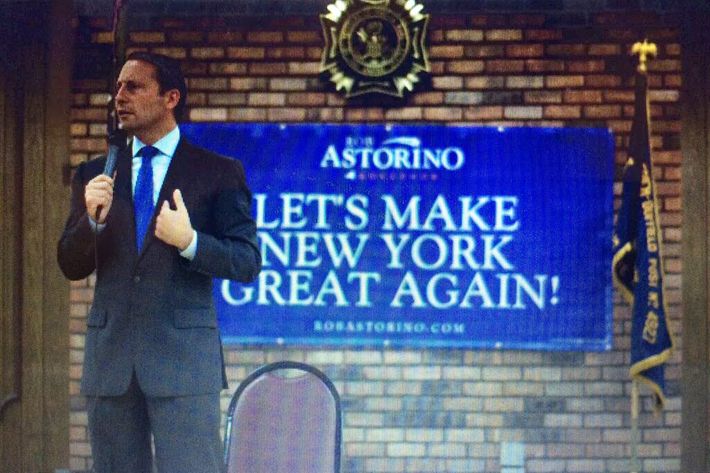
For now, Donald Trump is the riddle the Republican Party cannot solve. His stratospheric popularity shows no signs of abating. The situation has become so dire that some top Republicans in New York mused aloud about kicking Trump out of the party altogether — a development that Trump gleefully acknowledges. Earlier this month, Trump headlined a fund-raiser for the Pennsylvania GOP at the Plaza Hotel, where he spotted in the audience Ed Cox, the sandy-haired chairman of the state GOP.
“Thank you so much for your leadership,” Trump said, according to sources in the room, while Cox beamed. And then he stuck the shiv in. “And I want to thank you for not clearing the field for me last year. Because I have been having so much more fun now.”
That was a reference to a now-little-remembered political moment three years ago, when Trump began musing aloud about running for governor. It was a flirtation considered by many in the GOP Establishment to be a joke, another Trumpian political flirtation of the kind he made every couple of years. But sources close to real-estate magnate say that he was far more serious about a run than was thought at the time. And had he run, the Republican Party could have avoided the Trump-size problem they are facing at the moment.
All Ed Cox had to do was learn the art of the deal.
Back in late 2013, Trump began publicly floating a run for governor against Andrew Cuomo, he of the 66 percent approval rating and $40 million fund-raising operation. The flirtation was considered by most political and media professionals to be a joke, just like his quadrennial presidential forays. And Albany? Do they even have winning there?
But those involved in the effort say that Trump was far more interested in a run than he was given credit for.
“Absolutely. He was dead-serious about it,” said Carl Paladino, the 2010 GOP nominee.
The original idea behind a Trump candidacy was the brainchild of a trio of New York State assemblymen who were convinced that the likely alternative, Westchester county executive Rob Astorino, was headed for a historic defeat. They wanted someone who could self-fund and at least put the scare in Cuomo. “For Republicans in New York, that boils down to one name,” said Michael Caputo, a political consultant involved in the early efforts. “And that is only Donald Trump.”
And so the three assemblymen — Joseph Borelli of Staten Island, Bill Nojay of Rochester, and David DePietro of the Buffalo area — plus Caputo met with Trump and his consigliere Michael Cohen at the real-estate magnate’s office. (Cohen declined to comment, saying that he was “not the biggest fan of New York Magazine.”) Trump told them, “It’s not something I am looking at.” He said he had his eye on something bigger — but he did want to continue the discussion with Paladino.

In the meantime, DiPietro put together a memo explaining how Trump could win mostly by going hard after a new gun-control law pushed by Cuomo, which he wrote could provide 300,00 to 500,000 new voters, and by running against Bill de Blasio, New York’s “first truly radical mayor, a man who still reveres the Sandinistas, honeymooned in Havana, and self-describes as a believer in liberation theology (i.e., Marxism).”
Trump, the memo continued, could beat back the Democrats’$2 2–1 registration advantage because “Trump is not considered a Republican — he is his own brand, an almost iconic figure of Rockefellerian proportions. This will benefit him because many people who could never bring themselves to vote for a Republican would vote for Trump as Trump,” adding that “a key positive for Trump is the public perception that he does not pander to special interests, and will deliver on promises.”
Paladino flew in from New York, and the two went to Jean-Georges in Trump Plaza for dinner, even though Paladino began feeling an onset of kidney stones just before the meal. (“You know how they ask you how much pain you are feeling? I was at 11 by the time I walked outta there.”)
Trump wanted to know about Paladino’s own race. Back in 2010, Paladino, a tea-party favorite, stole the nomination from Rick Lazio, who was the chosen candidate of the GOP Establishment — and in particular of Cox, who until he assumed leadership of the New York Republican Party was probably most known for his White House wedding to Richard Nixon’s daughter Tricia. After Paladino won, Cox and his fellow Republican mandarins kept their distance, with perhaps good reason: Paladino spoke often of taking a baseball bat to the ways of Albany and campaigned with a Louisville Slugger over his shoulder.

“I warned Trump — the Establishment are a bunch of assholes, man. They are in it for their own free ride and their own power. I told him you have to forget about this primary thing and get the party to come out for you now,” Paladino recalled.
Trump agreed, but also confided to Paladino that he was already thinking of running for president. What would he do if he won? Preside over the state for 18 months before launching a national bid?
Trumpworld was divided on this point, with advisers like Roger Stone and Sam Nunberg arguing against, but Cohen and others suggesting that a win in New York would provide him with a boost for a later presidential campaign.
More meetings followed, including one with close to 50 county chairs, local sheriffs, and grassroots activists. “You could see the wheels turning. Others were driving the discussion, but he seemed very engaged and curious,” said Nick Langworthy, chairman of the Erie County GOP, a major stronghold of Republican support.
As 2014 dawned, momentum continued to build. Trump’s kids, who were at the meeting with the county chairs, were pushing him to run, people involved in the process said, and Trump was in regular contact with party leaders who were behind his effort. Caputo and Langworthy put together a list of dozens of county chairs they said were supportive. Cox flew down to Trump’s Florida resort, Mar-a-Lago, to explain how the primary and convention process would work. Trump grew more insistent that he would only run if Cox cleared the field. Cox demurred, in part because Astorino was exactly the kind of suburban moderate the party thought would win swing parts of the state, but also because Cox didn’t think Trump would actually do it, and the party risked being left without a candidate at the top of the ticket, according to top party operatives.
“Oh, I think Ed was just trying to call his bluff,” said one Astorino adviser. “What do you need a clear field for? If you are as strong as you say you are, if you have all of these county leaders behind you and you have universal name ID and what you say is unlimited resources, then why not just go out and beat Rob like say you can?”
For Trump, though, the prospect of a primary meant a waste of time for what was sure to be a slog against Cuomo. A loss would crush his presidential ambitions, and even a win would complicate them, Trump confided to those urging him to run.
Cox, who declined to comment for this story, began calling county chairs who were being seduced by Trump, and made sure they knew his history of tiptoeing up to the line and not running. Paladino tried to convince Astorino to stand aside, telling him that he could be Trump’s running mate and then take over 18 months later when Trump ran for president. Trump himself toured the state, headlining fund-raisers where he laid out a message that now sounds familiar: People were fleeing the state in droves; New York had become a laughingstock for the rest of the nation; Cuomo was lowering tolls merely because Trump was pressuring him; elect Trump governor and “I would make New York State one of the great energy capitals of the world and I would cut everybody’s taxes in half.”
In Albany, Trump headlined a raucous pro-gun rally at the state capitol organized by Paladino, telling the thousands assembled that New York was in “big trouble” because of “bloated government, corruption all over the place.”
“You have the constitutional right to keep and bear arms. You have that right and they want to take it away,” Trump said. “And they are taking it away, slowly but surely, they are taking it away.”
After a fund-raiser in Buffalo, a dozen party poo-bahs went out to dinner at Salvatore’s, a legendary area restaurant featuring wall-to-wall mirrors. In a private room, Trump lit into Cox, telling him, “You are ineffectual, you can’t win anything.” He said that Cox needed to stop working for Astorino behind the scenes.
“I’m not doing anything!” Cox protested, according to multiple sources who were there.
“Don’t lie to me!” Trump responded, dismissing the chairman with a wave of the hand.
In the end, of course, Cox didn’t clear the field, and Trump didn’t run, announcing his intentions on Twitter. Cox and the political wisenheimers insist they were right all along, that the governor’s race was just another ego trip by someone who had a lifetime’s worth of political flirtations. But those who met with him regularly, many of them political pros trained to suss out the serious would-be candidates, say no, that Trump was ready to go if Cox gave the word.
“This whole thing went on for months and months,” said Langworthy, who spoke with Trump nearly every week during the pre-campaign. “I just don’t think he would have devoted that much time to it if he wasn’t serious.”

Astorino, using the campaign slogan “Make New York Great Again,” went on to lose to Cuomo, as badly as Trump and others predicted he would. But in all likelihood, had Trump run, he would have done just as poorly as Astorino, if not worse. “New Yorkers are pretty used to celebrity, and pretty used to Trump,” said one GOP consultant close to Cox. “I just don’t think they would have fallen for it.” Trump’s unfavorability rating in New York is close to 70 percent. The built-in media infrastructure that surrounds a presidential race wouldn’t have materialized for a gubernatorial run, even for someone of Trump’s celebrity. Plus, New York remains a state that hasn’t elected a Republican statewide since 2002, and when that dry run ends, it won’t be by someone spouting a tea-party-infused politics of resentment.
Of course, Trump is now atop the polls in the 2016 race. Republicans are cringing at things he says and seem to have resigned themselves to hoping he somehow stumbles before the primaries. But the great irony is that had Cox gotten Astorino out of his way, and Trump run for governor and lost badly, it is nearly impossible to imagine him turning around and running for president seven months later. It’s just another painful thought for the GOP to entertain while they ponder their Trump-size quagmire.





























